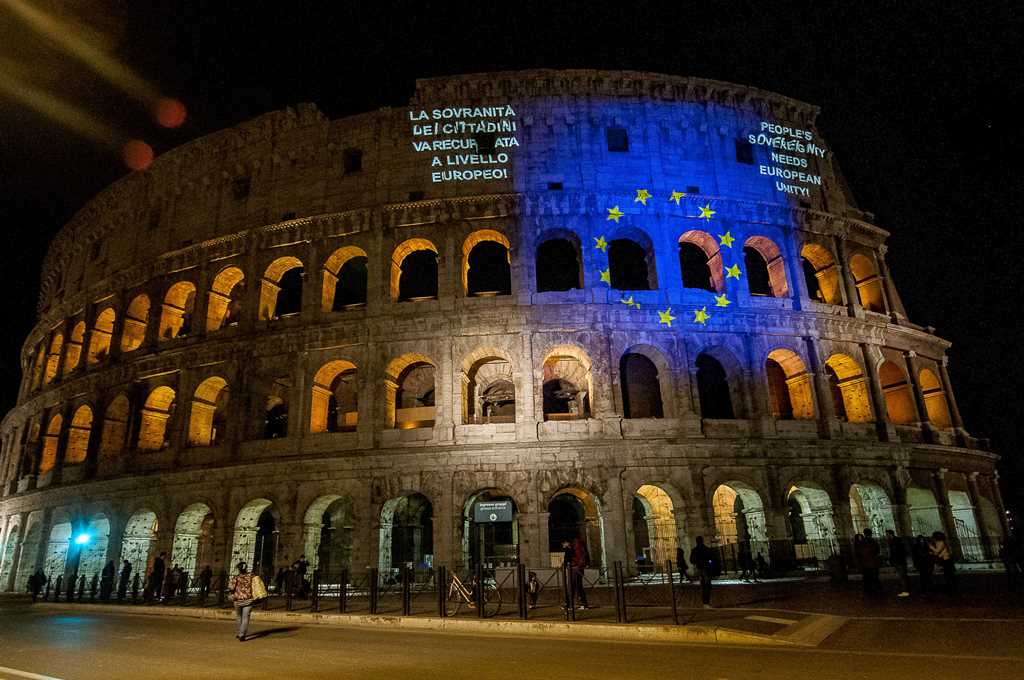Conflict over Italy’s 2019 Budget: Implications for European Policy

Annual budgets of eurozone countries must be presented to the EC by mid-October. The Stability and Growth Pact obliges the EC to issue an opinion on these budgets and to verify that they meet the requirements of the fiscal framework. The EU Council issues these requirements under the European Semester and the Member States are required to include them in their budgetary plans for the following year. The EC issued an urgent opinion on the project submitted by Giovanni Tria, Italy’s finance minister, due to the significant violations of the pact. Italy had until 14 November to alter the project to meet the Commission’s expectations but did not. On 21 November, the EC will issue a final formal opinion on all budgets of the Eurogroup.
The Draft Italian Budget
The governing coalition of the Five Star Movement and the League is planning to implement part of their campaign promises with its draft budget for 2019. The budget submitted to the Commission includes lowering taxes (scrapping the VAT increase planned by the previous government), introducing “civic income” for about six million Italians affected by long-term unemployment, and partially abolishing the pension reform of 2011 (including a lower retirement age for people who have worked a certain number of years). These promises will cost about €80–100 billion. At 2.4% of GDP, next year’s projected budget deficit will be three times higher than the 0.8% planned by the previous government under Paolo Gentilioni. The draft budget for 2019 is in contradiction with the recommendations for Italy approved in June by the EU Council. The EC accuses the government of abandoning the mandatory reduction of excessive public debt (which should not exceed 60% of GDP). Italy’s debt is currently 132% of GDP, the second highest in the EU after that of Greece.
The Italian government says there is a need to change economic policy which, although in accordance with EU fiscal rules, it maintains has proved ineffective. The country’s problems include low productivity, a drop in real wages and high-level long-term unemployment (60% of all unemployed). Italy is threatened with economic stagnation. The government intends to increase spending in order to stimulate sustainable economic growth. It forecasts that implementation will lead to GDP growth of 1.5%, 1.6%, and 1.4% in the coming three years, and hence contribute to a lower budget deficit. However, government forecasts are being questioned by the Commission, which estimates an increase of no more than 1.2% of GDP for 2019. In such a case, increased public spending would contribute to a higher budget deficit.
The European Commission’s Options
Should Italy refuse to comply with the opinion on the national budget, the EC has two options under the pact. It may take either preventive or corrective measures, each of which may result in sanctions, but neither of which prevents Italy’s government from implementing its budget. The preventive procedure is gentler and phased in over time. Within its framework, sanctions may be implemented only after the negative effects of the disputed fiscal policy have materialised. A decision on such an effect, supported by macroeconomic data, could be made no earlier than the middle of next year. The penalty in this case, which must be approved by the Council, would be a transfer to the EU of an interest-bearing deposit of 0.2% of GDP. If the preventive path does not prompt Italy to adapt its budget to the EC’s requests, that may lead to the initiation of the EDP. It would be more restrictive to initiate the EDP as soon as the EC’s opinion is published (within the corrective path). The regulations allow such action in the event of gross non-compliance with the pact. The decision, based on macroeconomic data on the state of Italian finances for 2017, would be justified by the fact that the government does not aim to rectify the situation. The EC could recommend immediate implementation of sanctions (interest-free deposit), which would take place after 10 days unless rejected by a qualified majority Council vote. In the standard EDP procedure, and based on the EC recommendation, the Council would have three months from Italy’s draft budget to decide on the start of the EDP, setting a deadline for the government to take action. Only after this time (at the earliest in the middle of 2019) could a decision could be taken to impose sanctions. Restrictions could include a requirement to pay a non-interest-bearing deposit of up to 0.5% of GDP, as well as withholding the payment of structural and investment funds. In the event of permanent failure to comply with the rules, a deposit made can be turned into a fine.
Threats to the EU
The dispute between Italy and the EC is not only important for the Italian economy, but also for the stability of the euro area. Immediate initiation of the excessive deficit procedure may cause a negative reaction on the financial markets. This will weaken Italy’s standing as the third-largest economy in the eurozone, contributing to an increase in the cost of servicing public debt.
The conflict between the EC and Italy may have consequences for the reform of the eurozone. If the EC does not decide to initiate the EDP, awaiting the consequences of the budget implementation, the group of states referred to as the Hanseatic coalition (the Baltic States, Denmark, the Netherlands, Ireland, Finland, Slovakia and Sweden) will block the reform of the Economic and Monetary Union in the face of a gross violation of the EU fiscal rules by a Eurogroup member. Thus, announcements of a swift finalisation of the banking union (including a compromise on the European deposit insurance scheme) may turn out to be premature.
A restrictive position by the Commission may lead to the Italian government taking a more robust stance on European politics. Italy plays a key role in the EU’s migration policy and will use its position in the reform of the asylum system. In addition, the dispute will play a role during the European Parliament election campaigns. Both the Five Star Movement and the League are building pan-European coalitions in opposition to the largest political forces in the EP, as well as to EU institutions led by representatives of these forces. Should the Commission take a belligerent attitude, this could boost support for a new formation.
Conclusions
A conciliatory attitude towards the Italian government seems to be the most likely. Maintaining dialogue and postponing the launch of the EDP is a strategy that the Commission could follow to minimise negative effects on both sides. It is possible that, during the dialogue, Giuseppe Conte’s government, wanting to implement euro-area reforms in the area of banking sector risk sharing, will introduce some changes to the draft budget in line with EC guidelines. In such a case, the Commission will be interested in convincing the sceptical Hanseatic coalition states to compromise over solutions implemented to a more limited extent than was announced by this year’s Franco-German declaration in Meseberg.
In the short term, a gentle stance may encourage Italy to maintain its collision course and await potential sanctions. Yet such an attitude could not be sustained due to the anticipated reaction of financial markets leading to a sharp increase in Italian bond interest rates. In that case, the government would ultimately have to abandon part of the planned expenditure in order to avoid the collapse of public finances.
If the EC decides to implement the conciliation strategy, it may bring positive political consequences for Poland. This would weaken the European position of the Five Star Movement and the League, both of which are opposed to maintaining EU sanctions against Russia. In the economic sphere, the high share of foreign trade in Poland’s GDP may lead to an extended conflict that will have negative effects on Europe’s economy because of the indirect impact of the crisis in Italy.




